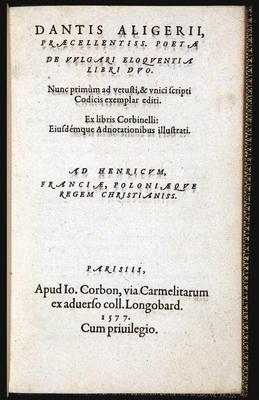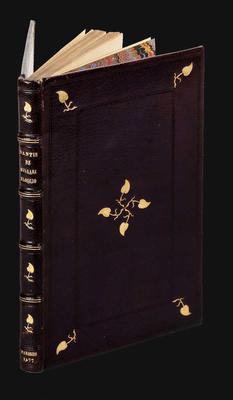Dante Alighieri
Dantis Aligerii, praecellentiss. poeta De vulgari eloquentia libri duo.
Paris, Jean Courbon, 1577.8° (161×100 mm). Collation: ã4, A-E8, F-G4, H-K8, L4. [8], 82, [12], 56, [2] pages. Issue A with leaf ã2 in first state. Woodcut decorated initials and head-pieces. Twentieth-century blue morocco gilt, marbled flyleaves, inside dentelles, gilt edges. A very good copy.
Provenance:Marquis D'Adda (ex-libris on thefront pastedown); Livio Ambrogiocollection.
First edition of the origina Latin version of the De vulgari eloquentia. The text was edited by the Florentine humanist Jacopo Corbinelli (1535-1590), who was in exile in France. He based his edition on a manuscript (today in the Bibliothèque Municipale of Grenoble, ms. 580), which he received as a gift from the Floretine abbot Pietro del Bene, who had found it in a church in Padua. Corbinelli also used Trissino's Italian translation. The Grenoble codex shows the work of revision and correction of the text carried out by Corbinelli: only a part of the many annotations he wrote on the margin of the manuscript can be traced in the Paris print.The edition was thought as a response to those in Italy and especially in Florence who supported the purest Florentine language against the koiné of Italian dialects proposed by Dante. It is dedicated to the King of France Henry III and, beside the De vulgari, contains: a Latin eulogy of Dante by the French Pléïade poet Jean Dorat (1508-1588); other Latin verses by Giovanni Matteo Toscano (1500-1576) in praise of the book edited by Corbinelli; and a poem in French addressed to Henry III by Jean-Antoine Baïf (1532-1589), in which the king is praised for giving protection to Corbinelli, a refugee like Dante himself.Moreover, at the end of the volume are: a passage the Vita di Dante byBoccaccio; the index of names; two letters addressed to Corbinelli by the French scholar Guillaume Postel (1510-1581); an anonymous poem in praise of Dante; a dedication by Corbinelli to Pierre Forget, counselor of the king; and finally Corbinelli's Annotationi in Italian (only to book I).



